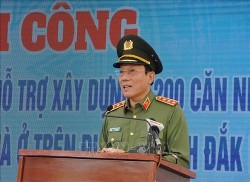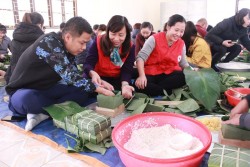
Harnessing Buddhist principles in social welfare work
Latest
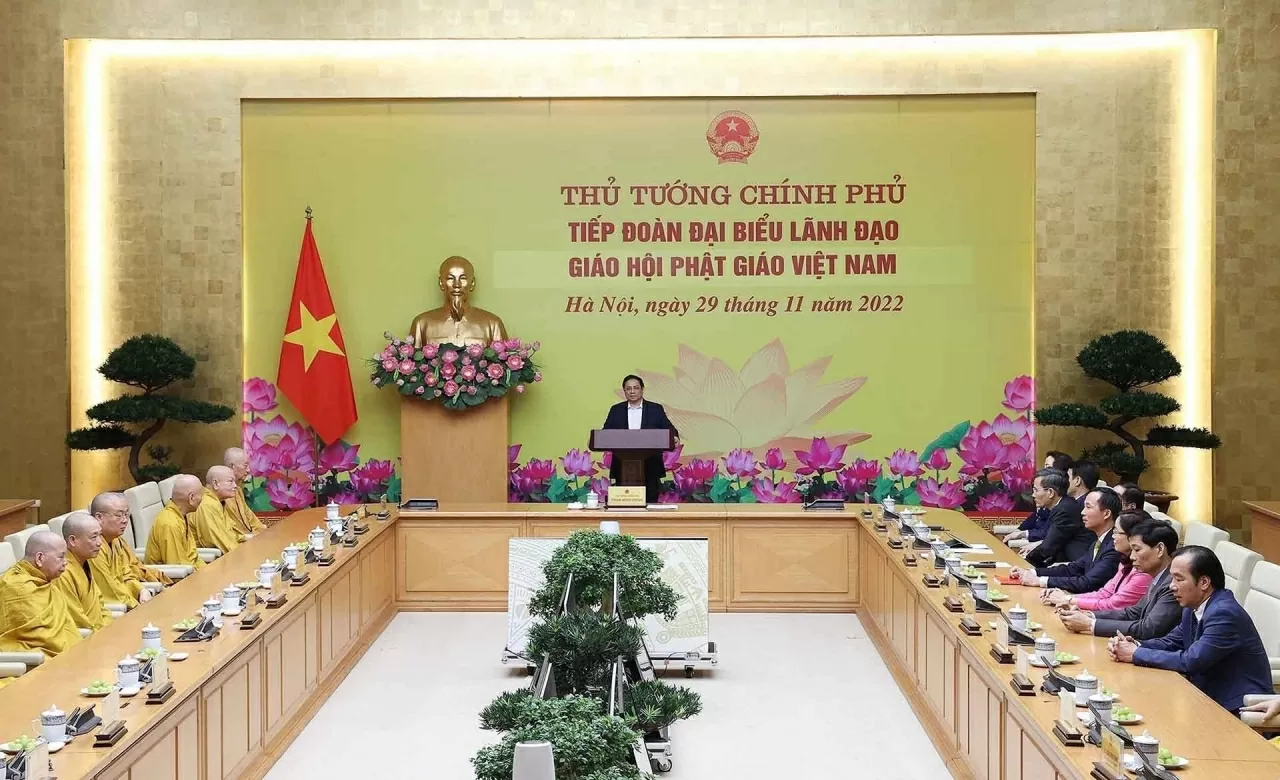 |
| Prime Minister Pham Minh Chinh received a delegation of leaders from the Vietnam Buddhist Sangha, November 29, 2022. (Source: VNA) |
In recent years, social welfare work in Vietnam has made significant progress, and Buddhism has played a vital role in this development. This contribution stems from the shared values between Buddhist teachings on human compassion and the ideals of the Communist Party of Vietnam, which aim to bring prosperity and happiness to the people.
Buddhism and social welfare
Guided by teachings that uphold human dignity and compassion, Buddhist welfare initiatives focus on providing practical support to individuals in need. Every activity places human value, dignity, and rights at its core, ensuring that aid is directed toward real, urgent needs.
The 1948 Universal Declaration of Human Rights affirms that everyone, as a member of society, has the right to social security, based on the satisfaction of economic, social, and cultural rights essential for dignity and free development.
Across countries, definitions of social welfare may vary. The International Labour Organization (ILO) defines social welfare as a system of societal protection against income insecurity caused by illness, maternity, workplace accidents, unemployment, disability, old age, or death - while also ensuring access to healthcare and support for large families.
In Vietnam, this right is enshrined in Article 29 of the 2013 Constitution, which mandates equal opportunity for all citizens to benefit from social welfare and the development of a comprehensive welfare system. This commitment is further detailed in various legal documents, such as the Labour Law, the Law on Social Insurance, the Law on the Elderly, and the Law on People with Disabilities.
The 12th National Congress of the Communist Party of Vietnam (2016) emphasized promoting the positive values in culture and religious beliefs. The 13th Congress (2021) reaffirmed this by calling for the mobilization of religious resources for national development. These policies have provided a foundation for greater participation of religious organizations, including the Buddhist Sangha, in social welfare initiatives.
In its 2022-2027 agenda, the Vietnam Buddhist Sangha committed to mobilizing monks, nuns, and followers to uphold patriotism, strengthen national unity, support environmental protection, disaster response, and social welfare initiatives, and contribute to national defense and development.
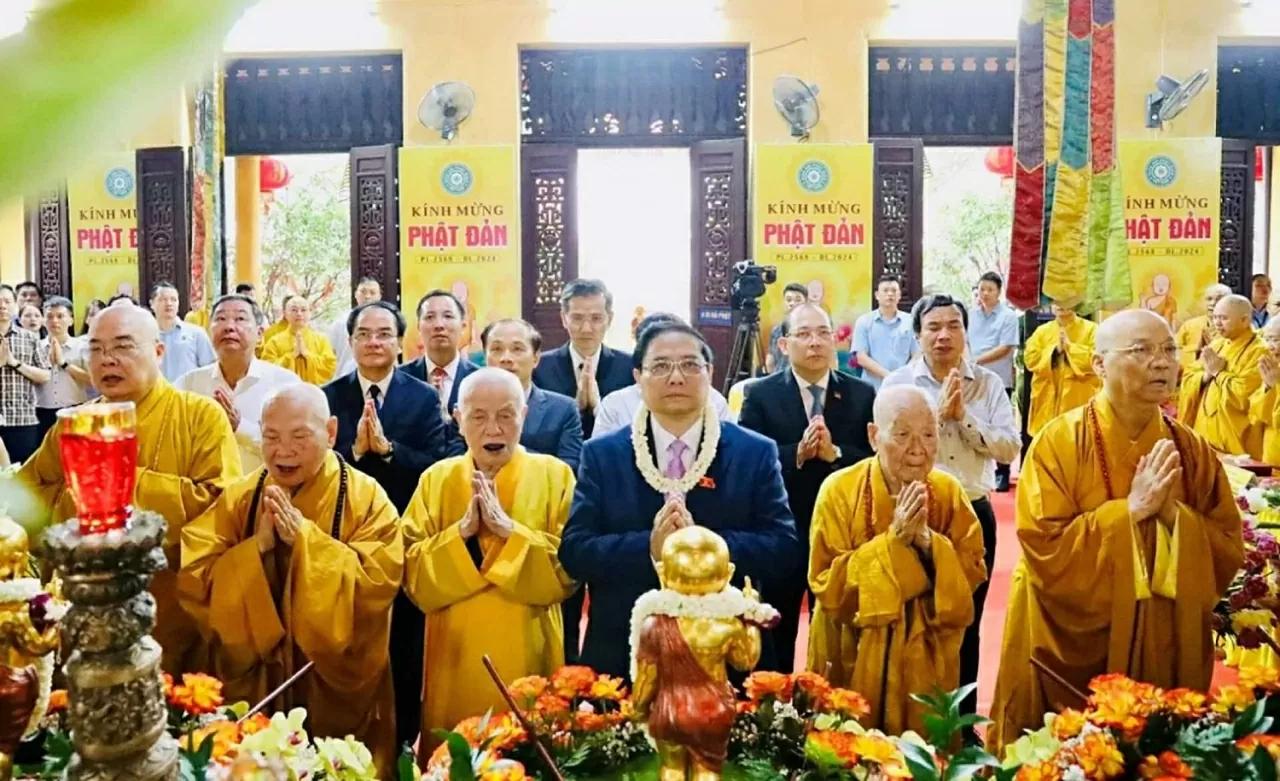 |
| On May 22, 2024, at Quan Su Pagoda in Hanoi, Prime Minister Pham Minh Chinh visited and extended his greetings to the Vietnam Buddhist Sangha on the occasion of Vesak Day, Buddhist Calendar 2568 - Gregorian Calendar 2024. (Source: Ministry of Home Affairs) |
| “We are proud and deeply moved by the contributions of Buddhist monks, nuns, and lay followers to social work and humanitarian efforts. Their actions ease the burdens of daily life for many, supporting national goals such as poverty alleviation, public health, and sustainable development” - Prime Minister Pham Minh Chinh stated during the 2024 Vesak celebration at Quan Su Pagoda in Hanoi. |
Buddhist contributions in practice
To address unemployment and provide vocational opportunities, the Buddhist Sangha has established free vocational training schools across the country, offering courses in sewing, household electronics, IT, mechanical repair, and hairstyling. Many students have become skilled workers producing high-value products. Free language classes are also offered to underprivileged students to improve their job prospects.
Nationwide, there are currently 10 vocational schools managed by local Buddhist administrative committees. Numerous temples also provide job placement support for trained individuals.
Buddhist social work has also extended to the care of vulnerable groups through hundreds of centers supporting orphans, the elderly, and people with disabilities. The Sangha maintains nearly 170 Tue Tinh traditional medicine centers, 700 herbal clinics, and 10 general clinics, collectively serving tens of thousands of patients annually with free medical consultations and medications.
During the Covid-19 pandemic, Buddhist organizations actively supported government-led initiatives by donating to national Covid-19 and vaccine funds. Monks, nuns, and lay practitioners donated to government vaccine and relief funds, while many volunteered on the frontlines, providing meals and emotional support to communities in crisis.
Following Typhoon Yagi, in response to calls from General Secretary, President To Lam and the Central Committee of Vietnam Fatherland Front, the Vietnam Buddhist Sangha mobilized donations from temples and philanthropists nationwide to support disaster-stricken communities. In Ho Chi Minh City alone, over 3.5 billion VND was raised during the campaign’s launch.
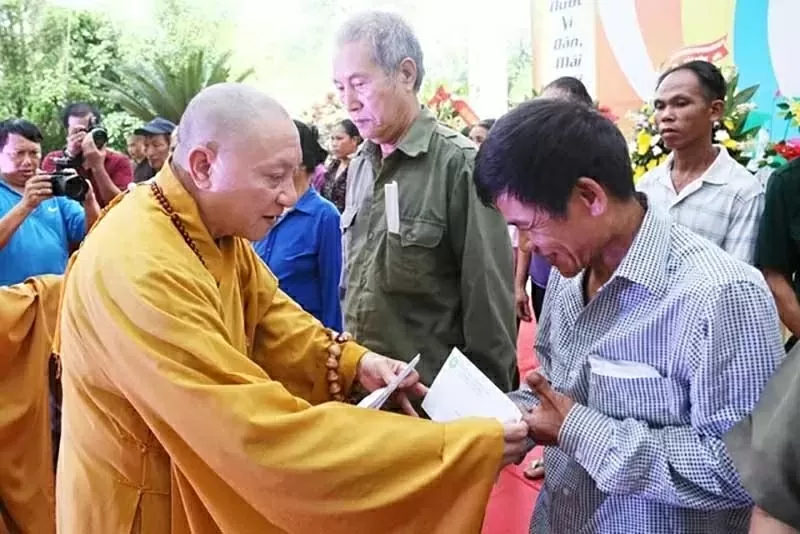 |
| The Vietnam Buddhist Sangha presents gifts to people in difficult circumstances. (Source: People's Army Newspaper) |
Addressing challenges
Despite these efforts, the Buddhist community's involvement in social welfare still faces challenges. Some individuals have exploited charity work for personal gain or publicity, undermining genuine humanitarian values and eroding public trust in Buddhist-led initiatives.
Furthermore, the pressures of a market-oriented economy and international integration have distorted some religious welfare efforts. In some instances, charitable activities stray from their ethical goals and become overly influenced by self-interest, losing sight of the mission to serve the vulnerable.
| More from WVR |
 UN Special Rapporteur applauds Vietnam’s progress on economic development and social welfare programmes UN Special Rapporteur applauds Vietnam’s progress on economic development and social welfare programmes |
These limitations must be addressed to strengthen the role of Buddhism in social welfare. The following policy recommendations are proposed:
Firstly, update and refine laws governing social welfare to remove outdated or restrictive provisions. Enhance coordination mechanisms between Buddhist organizations, the Fatherland Front, and mass organizations, while providing preferential policies for grassroots religious workers.
Secondly, ensure social welfare policies better accommodate the involvement of religious organizations. This includes revising regulations on receiving foreign aid, which currently complicate Buddhist organizations’ ability to manage international charitable donations. Legal barriers in adopting or housing orphans must be reconsidered. Under current regulations, state-run centers are preferred, while private or religious organizations must meet stringent conditions that many cannot fulfill.
| The Sangha maintains nearly 170 Tue Tinh traditional medicine centers, 700 herbal clinics, and 10 general clinics, collectively serving tens of thousands of patients annually with free medical consultations and medications. |
Thirdly, build capacity among Buddhist social workers through specialized training and better infrastructure. Improve financial independence for monastics and religious centers, particularly those not engaged in economic production, to reduce over-reliance on individual benefactors.
Efforts should also be made to reduce dependency on private donors by helping monasteries and retreat centers become more self-reliant, thereby safeguarding the spiritual integrity of their work. With its longstanding humanitarian mission, the Vietnam Buddhist Sangha is an indispensable partner in creating a more compassionate and equitable society.
Guided by the motto “Dharma - Nation - Socialism," Vietnamese Buddhism continues to contribute meaningfully to the country’s renewal, not only through religious practice but also by addressing the social needs of the people.







